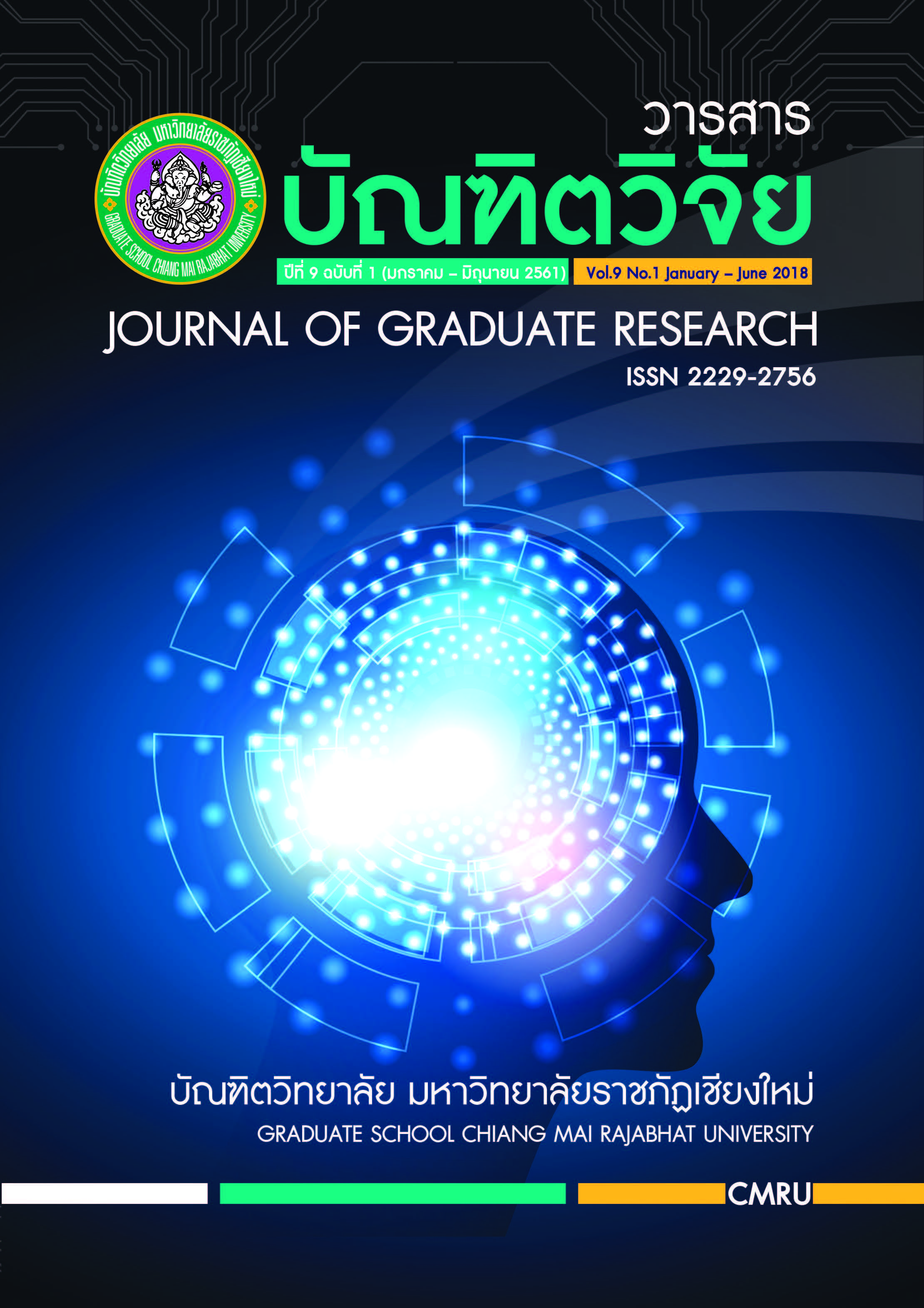ทิศทางการผลิตบัณฑิตการศึกษาพิเศษ คณะครุศาสตร์ มหาวิทยาลัยราชภัฏเชียงใหม่
Main Article Content
บทคัดย่อ
งานวิจัยนี้มีวัตถุประสงค์เพื่อ 1) ศึกษาความคิดเห็นเกี่ยวกับหลักสูตรการศึกษาพิเศษ และ 2) ศึกษาแนวทางในการผลิตบัณฑิตทางการศึกษาพิเศษในอนาคต ดำเนินการวิจัยด้วยการสนทนากลุ่ม (Focus Group) โดยใช้แบบสัมภาษณ์ มีผู้เข้าร่วมจำนวนทั้งสิ้น 25 คนโดยแบ่งกลุ่มผู้ให้ข้อมูลเป็น 3 กลุ่ม ได้แก่ กลุ่มผู้ใช้บัณฑิตการศึกษาพิเศษจำนวน 9 คน กลุ่มบัณฑิตการศึกษาพิเศษ จำนวน 8 คน และกลุ่มหน่วยงานที่เกี่ยวข้อง จำนวน 8 คน ได้มาจากการคัดเลือกแบบเจาะจง (Purposive Sampling) และการวิเคราะห์ข้อมูลด้วยการวิเคราะห์เนื้อหา (Content Analysis)
ผลการวิจัยพบว่า 1) หลักสูตรการศึกษาพิเศษมีจุดแข็งในเรื่องเป็นศาสตร์เฉพาะในการให้ความช่วยเหลือผู้เรียนที่มีความต้องการพิเศษและผู้ปกครองบัณฑิตการศึกษาพิเศษมีบุคลิกภาพและมีมนุษยสัมพันธ์ที่ดี มีความเข้าใจบุคคลอื่น จุดที่ควรพัฒนาคือ ควรเพิ่มการฝึกปฏิบัติให้มากขึ้น มีรายวิชาสำหรับพัฒนาเด็กที่มีความต้องการพิเศษในเรื่องการสอนเด็กในชั้นเรียนร่วม บัณฑิตการศึกษาพิเศษเป็นที่ต้องการของตลาดแรงงานสามารถประกอบอาชีพอื่นนอกเหนืออาชีพครูในระบบราชการ โดยประกอบอาชีพอิสระหรือหน่วยงานเอกชนได้ 2) แนวทางในการผลิตบัณฑิตทางการศึกษาพิเศษในอนาคต ประกอบด้วย ด้านหลักสูตรที่สอดคล้องกับการเรียนรู้ในศตวรรษที่ 21 และ ไทยแลนด์ 4.0 และทักษะภาษาอังกฤษ ด้านการจ้างงานควรมีการทำบันทึกข้อตกลงความร่วมมือ หรือ MOU (Memorandum of Understanding) รวมถึงการฝึกงาน และการรับบัณฑิตเข้าทำงาน ด้านการผลิตเอกคู่ควรเชิญผู้เชี่ยวชาญเป็นผู้ให้ข้อมูลและระบุความต้องการ และควรพัฒนารายวิชาที่มีการบูรณาการศาสตร์ของเอกคู่เข้าด้วยกัน เพื่อเป็นจุดเด่นของการผลิตและสะท้อนถึงคุณภาพของการพัฒนาหลักสูตร
Downloads
Article Details
เอกสารอ้างอิง
จารุณี ภัทรวงษ์ธนาและพงศ์กร จันทราช. (2560). การศึกษาทิศทางการพัฒนาหลักสูตรเทคโนโลยีสารสนเทศมหาวิทยาลัยฟาร์อีสเทอร์น. วารสารวิชาการมหาวิทยาลัยฟาร์อีสเทอร์น, 11(1), 257-267.
จีระพันธ์ พูลพัฒน์. (2553). พัฒนาการของการบริหารการศึกษาไทย. กรุงเทพฯ: โรงพิมพ์แห่งจุฬาลงกรณ์มหาวิทยาลัย.
บุญเลี้ยง ทุมทอง. (2553). การพัฒนาหลักสูตร. กรุงเทพฯ: สำนักพิมพ์แห่งจุฬาลงกรณ์มหาวิทยาลัย.
พระราชบัญญัติการจัดการศึกษาสำหรับคนพิการ. (2551).ราชกิจจานุเบกษา. เล่มที่125 ตอนที่ 28 ก. (5 กุมภาพันธ์ 2551).
ระวี สัจจโสภณ (2557). ศักยภาพและทิศทางในการผลิตบัณฑิตหลักสูตรศิลปศาสตรมหาบัณฑิต สาขาวิชาการพัฒนาทรัพยากรมนุษย์และชุมชน คณะศึกษาศาสตร์และพัฒนศาสตร์มหาวิทยาลัยเกษตรศาสตร์. นครปฐม: ภาควิชาการพัฒนาทรัพยากรมนุษย์และชุมชน คณะศึกษาศาสตร์และพัฒนศาสตร์มหาวิทยาลัยเกษตรศาสตร์ วิทยาเขตกำแพงแสน.
วิจารณ์ พานิช. (2556). วิถีสร้างการเรียนรู้เพื่อศิษย์ในศตวรรษที่ 21. กรุงเทพฯ: มูลนิธิสดศรี-สฤษดิ์วงศ์.
วิชัย วงษ์ใหญ่. (2554). การพัฒนาหลักสูตรระดับอุดมศึกษา. (พิมพ์ครั้งที่2). กรุงเทพฯ: อาร์แอนด์ปริ้นท์.
สงัด อุทรานันท์. (2532). พื้นฐานและหลักการพัฒนาหลักสูตร. (พิมพ์ครั้งที่ 3). กรุงเทพฯ: มิตรสยาม.
สาขาวิชาการศึกษาพิเศษ คณะครุศาสตร์ มหาวิทยาลัยราชภัฏเชียงใหม่. (2554). หลักสูตรการศึกษาพิเศษ (ฉบับปรับปรุง 2554). เชียงใหม่: คณะครุศาสตร์ มหาวิทยาลัยราชภัฏเชียงใหม่.
สำนักงานคณะกรรมการการศึกษาขั้นพื้นฐาน. (2550). รายงานการวิจัยเรื่อง คุณภาพการศึกษาของโรงเรียนแกนนำจัดการเรียนร่วมสำหรับบุคคลออทิสติก รูปแบบห้องเรียนคู่ขนาน กรณีศึกษา โรงเรียนดีเด่นใน 4 ภูมิภาค. กรุงเทพฯ: โรงพิมพ์ สกสค.
สำนักงานเลขาธิการคุรุสภา. (2555). มาตรฐานวิชาชีพครูการศึกษาพิเศษ. กรุงเทพฯ: โรงพิมพ์คุรุสภา.
Australian College of Education. (2001).Teacher Standards, quality and professionalism: Towards a nationally agreed framework. A statement by the Australian College of Education.
Oliva, P.F. (2001). Developing the Curriculum. (5 th ed.). New York: Longman.
Ornstein, A. C. and Hunkins, F. P. (1993). Curriculum Foundations, Principles and Issues. (2 nd ed.). Boston: Allyn and Bacon.
Palmer, C.D. (2006). Teacher professional standards: The views of highly accomplished special education teachers. Conference paper proceedings of the AARE 2006 International Education Research Conference. Australia, Adelaide.
Pueschel, S. M. (1995). Parent and professionals working partnership. In The special child: A source book for parent of children with developmental disabilities. (2nd ed). New York: Mo.
Sukbunpant, S., Arthur-Kelly, M., & Dempsey, I. (2012). Thai preschool teachers' viewsabout inclusive education for young children with disabilities. International Journal of Inclusive Education, 1-13.
Vorapanya, S. (2008). A model for inclusive schools in Thailand. (Doctoral dissertation, University of Oregon).


